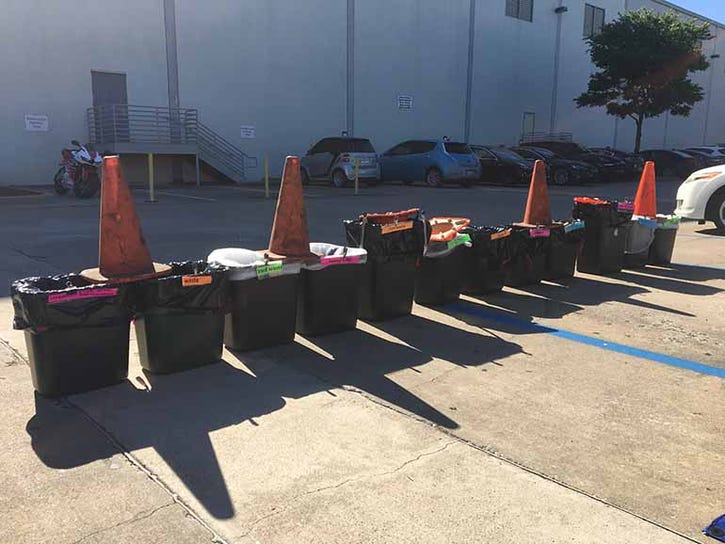Leveraging Data to Better Manage Multisite Corporate Waste Programs
A look at how ENGIE Insight works with businesses to bring their waste management and reduction practices into the 21st century.
When Panda Express, a fast-food Chinese restaurant chain, wanted to improve its waste program and enhance operations at its Innovation Kitchen in Pasadena, Calif., it turned to Washington-based ENGIE Insight.
ENGIE Insight is an energy and sustainability management company that works with multisite businesses to lower costs, drive efficiencies and reduce their environmental impact. About two and a half years ago, ENGIE took over Panda Express’ waste program after the restaurant chain sought ways to improve its overall footprint and sustainability practices, which included energy, water and waste reduction.
In an ENGIE Insight case study video, Roger Goldstein, executive director of facilities and energy for Panda Express Restaurant Group, explained sustainability is an ongoing effort that requires regular employee education and training.
“We are continuously out there educating and working with our teams and our operators to help improve things,” noted Goldstein. “We have to meet the demands of more and more municipalities and states putting regulations on their waste.�”

He added that various state and municipal regulations fall in line with the same business practices of Panda Express—mainly banning single-use plastics, like straws, bags and polystyrene takeout containers. And states like California, for instance, require restaurants and businesses to separate their organics and compostable food waste from their regular trash and recycling.
“That’s the next big challenge—making sure our business model can accommodate those changes, and they help drive us even further down the sustainable road,” said Goldstein.
Arnold Bowers, business solutions director at ENGIE Insight, sat down with Waste360 during WasteExpo 2019 in Las Vegas to discuss how the company acts as a consultant for businesses looking to bring their waste management and reduction practices into the 21st century. Since ENGIE took over the Panda Express waste program, the company delivered more than 20 percent savings to the restaurant chain’s bottom line, he noted.
Bowers, who began his career in the waste industry as a hauler and worked at Waste Management for 18-plus years, now spends his time at ENGIE helping clients build programs specifically tailored for their needs. That means everything from data collection and analytics and processing and paying their invoices, up to a total waste solutions management program.
“You can’t manage what you can’t measure. We provide a level of deep management of all those data points,” explains Bowers. “[At times] we’ll have different clients that come on board from a decentralized model that have hundreds of sites, and the corporate entity will have little visibility into what’s going on. We will drastically correct that. All that data will begin to flow to us and will be put into a point of single contact for them. With the platform, they can holistically manage and report across their organization.”
Examples of the data ENGIE extracts from businesses are things like types of containers, container size, pickup frequency, how much clients pay for waste collection services, fees and more. All that information is then added to the company’s platform, where it is accessible to clients.

“It’s also for us to use, and we can use that data to consult with our clients to say, ‘Here are the trends we see. We have analyzed your data, and do you know that you spend the same for waste service at a ‘C’ [level] as you do at an ‘A’ [level],’” he says. “It’s natural to think that the more business you do, the more waste you generate. So, they’ve operated under a set-it-and-forget-it program, where they just put a type and size of container out, say three times a week for service pickup, and then leave it alone. There are huge inefficiencies with that. We will work with them as their partners, dig into that data and say your ‘A’ sites should have that three-day pickup, but ‘B’ sites should be two days and ‘C’ sites should be one day.”
“Once you correct those changes and the actual generation of waste, the savings can be huge,” adds Bowers. “It can be economically impactful for them. It also can feed right into their sustainability program and the goals they set around diversion, around zero waste to landfill and things that they just don’t have the capability to do without the data.”

ENGIE also offers clients services related to issues with specific material types—such as hard-to-recycle items and sensitive or confidential materials that may need to be shredded or destroyed. Bowers says the top three elements of the company’s program are:
Procurement: The ability to shop the marketplace for vendors large and small and make recommendations based on the data found in the marketplace.
Optimization: Understanding what businesses generate, how much they generate and how ENGIE could help drive down service levels. “The fewer times a hauler comes to your site, the lower the cost,” he points out. “How can we get to those materials in a most optimized way?”
Zero waste: Addressing behavior by developing recycling and waste reduction training for clients, who then incorporate it into new-hire training initiatives.
“The good thing about the waste industry is that it’s extremely robust,” explains Bowers. “It’s an extremely exciting time in the industry. We’ve got a really positive vibe going, and as the economy does better in the U.S., so does the industry. I think the internal news right now is how do we overcome China’s National Sword? Cardboard’s value right now is way down, but that is just going to make us better domestically. I think it will help us find ways to deliver material to market with less contamination. I think you’ll see the contamination gap close with technology and focus, and I certainly think the industry will rise to the occasion.”
About the Author
You May Also Like




.png?width=300&auto=webp&quality=80&disable=upscale)